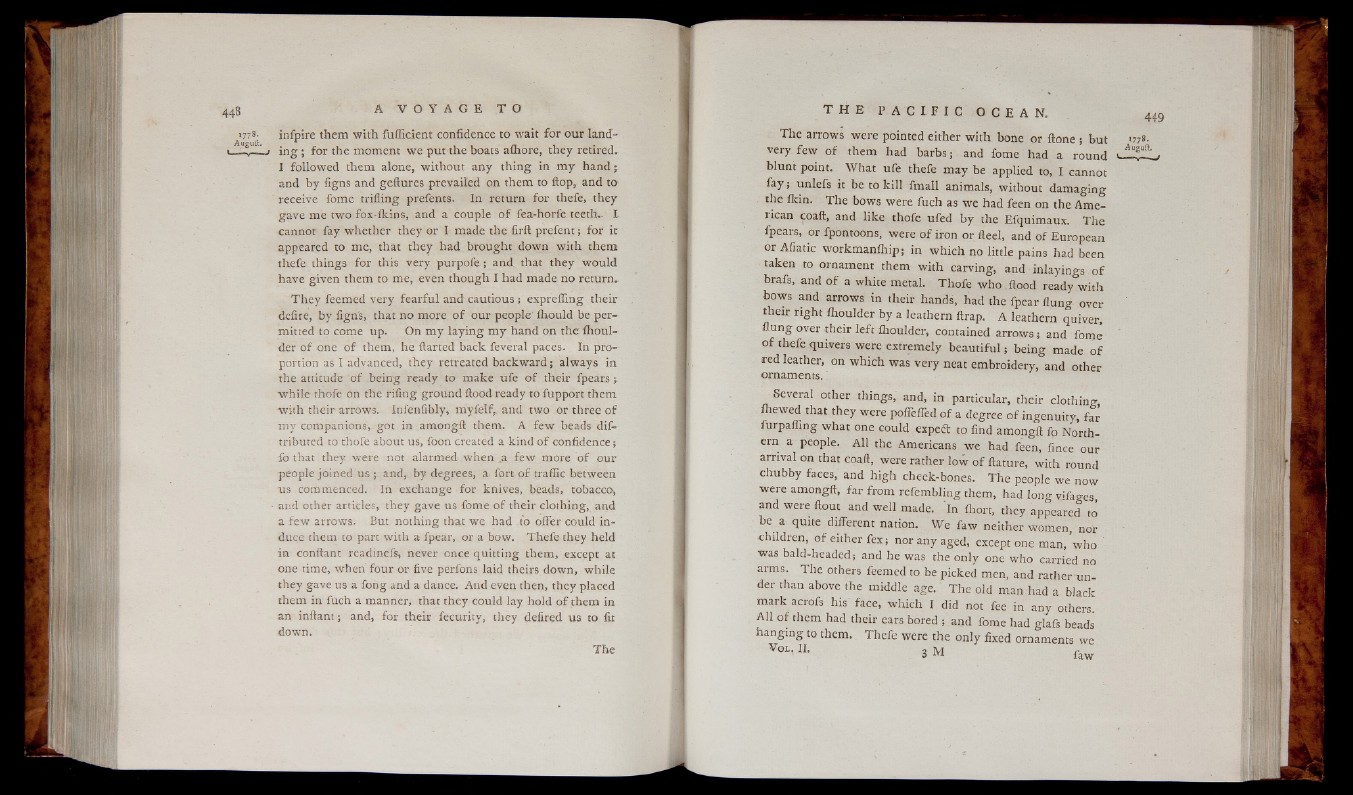
177s- infpire them w ith fufficient confidence to wait fo r our land-
■ Al £j^ ‘ , in g ; for the moment we put the boats aihore, they retired*
I followed them alone, without any thing in m y h a n d ;
and b y figns and geftures prevailed on them to flop, and to
receive fome trifling prefents. In return for thefe, they
ga ve me two fox-ikins, and a couple o f fea-horfe teeth, I
cannot fay whether they or I made the firft pre fen t; for it
appeared to me, that they had brought down with them
thefe things for this ve ry p u rp o fe ; and that they wou ld
have given them to me, even though I had made no return*
T h e y feemed ve ry fea rfu l and cautious ; exprelfing their
delire, by fign's, that no more o f our people' ihould be permitted
to come up. On m y la y in g m y hand on th e fhoul-
der o f one o f them, he ftarted back feveral paces. In proportion
as I advanced, they retreated b a ckw a rd ; always in
the attitude o f being ready to make ufe o f their fpears t
w h ile thofe on the riling ground flood ready to fupport them
with their arrows. Infenfibly, myfelf, and two or three o f
my companions, got in amongft them. A few beads distributed
to thofe about us, foon created a kind o f confidence;
fo that they were not alarmed when .a few more o f our
people joined us ; and, by degrees, a fort o f traffic between
us commenced. In exchange for knives, beads, tobacco,
• and other articles, they gave us fome o f their clothing, and
a few arrows. But nothing that we had to offer could induce
them to part with a fpear, or a bow. Thefe they held
in conftant readinefs, never once quitting them, except at
one time, when four or five perfons laid theirs down, while
they gave us a fong and a dance. And even then, they placed
them in fuch a manner, that they could lay hold o f them in
an inftant; and, for their fecurity, they defired us to fit
down.
T he arrows were pointed either with bone or ftone j but >778.
very few o f them had barbs; and fome had a round ‘
blunt point. What ufe thefe may be applied to, I cannot
f a y ; unlefs it be to k ill fmall animals, without damaging
the ikin. T h e bows were fuch as we had feen on the American
coaft, and lik e thofe ufed by the Efquimaux. The
fpears, or fpontoons, were o f iron or fteel, and o f European
or Afiatic workmanfliip; in w hich no little pains had been
taken to ornament them with carving, and inlayings o f
brafs, and o f a white metal. Thofe who .flood ready with
bows and arrows in their hands, had the fpear flung over
their righ t flioulder by a leathern ftrap. A leathern quiver,
flun g over their left flioulder, contained a r row s ; and fome
o f thefe quivers were extremely b e au t ifu l; being made o f
red leather, on w hich was v e ry neat embroidery, and other
ornaments.
Several other things, and, in particular, their clothing,
fhewed that they were poflefled o f a degree o f ingenuity, far
furpafling what one could expedl to find amongft fp Northern
a people. A ll the Americans w e had feen, fince our
arrival on that coaft, were rather low o f ftature, with round
chu bby faces, and high cheek-bones. T h e people we now
were amongft, fa r from refembling them, had long vifages,
and were flout and well made. In ihort, they appeared to
be a quite different nation. We faw neither women, nor
■children, o f either fex; nor any aged, except one m a n ,’who
was bald-headed; and he was the only one who carried no
arms. The others feemed to be picked men, and rather under
than above the middle age. ‘ The old man had a black
mark acrofs his' face, w hich I did not fee in any others.
A ll o f them had their ears bored ; and fome had glafs beads
h an g in g to them. Thefe were the only fixed ornaments we
V o i ' “ • 3 M faw